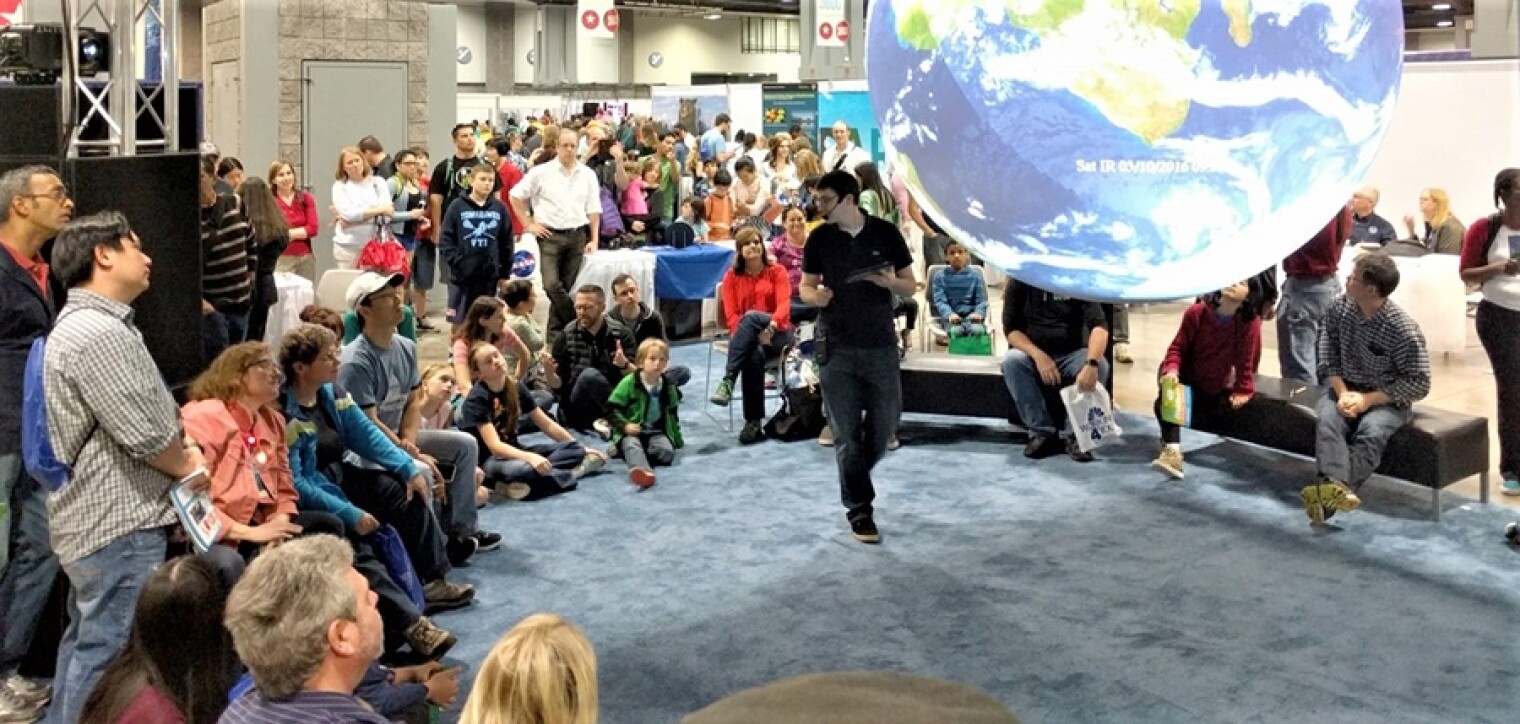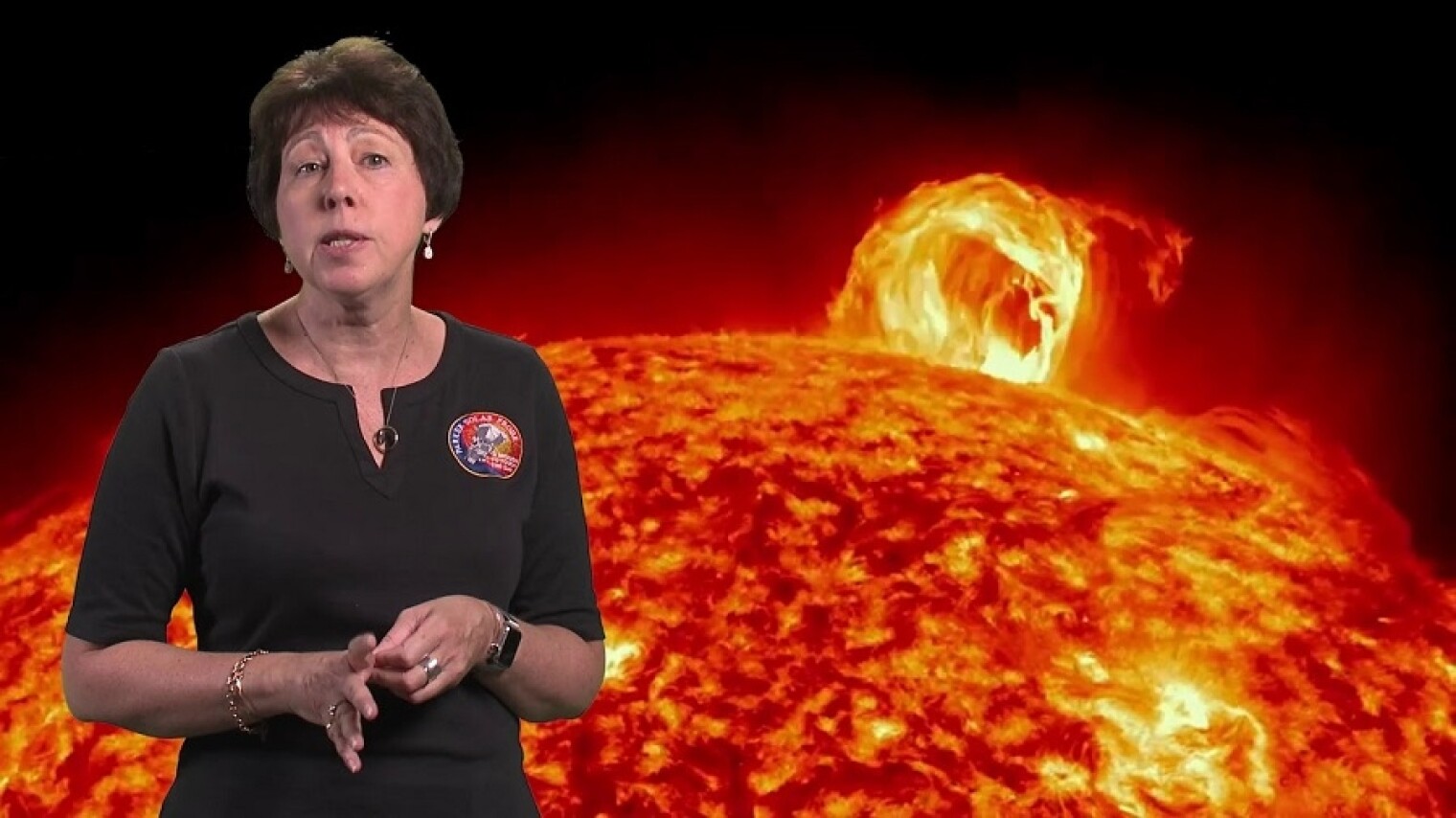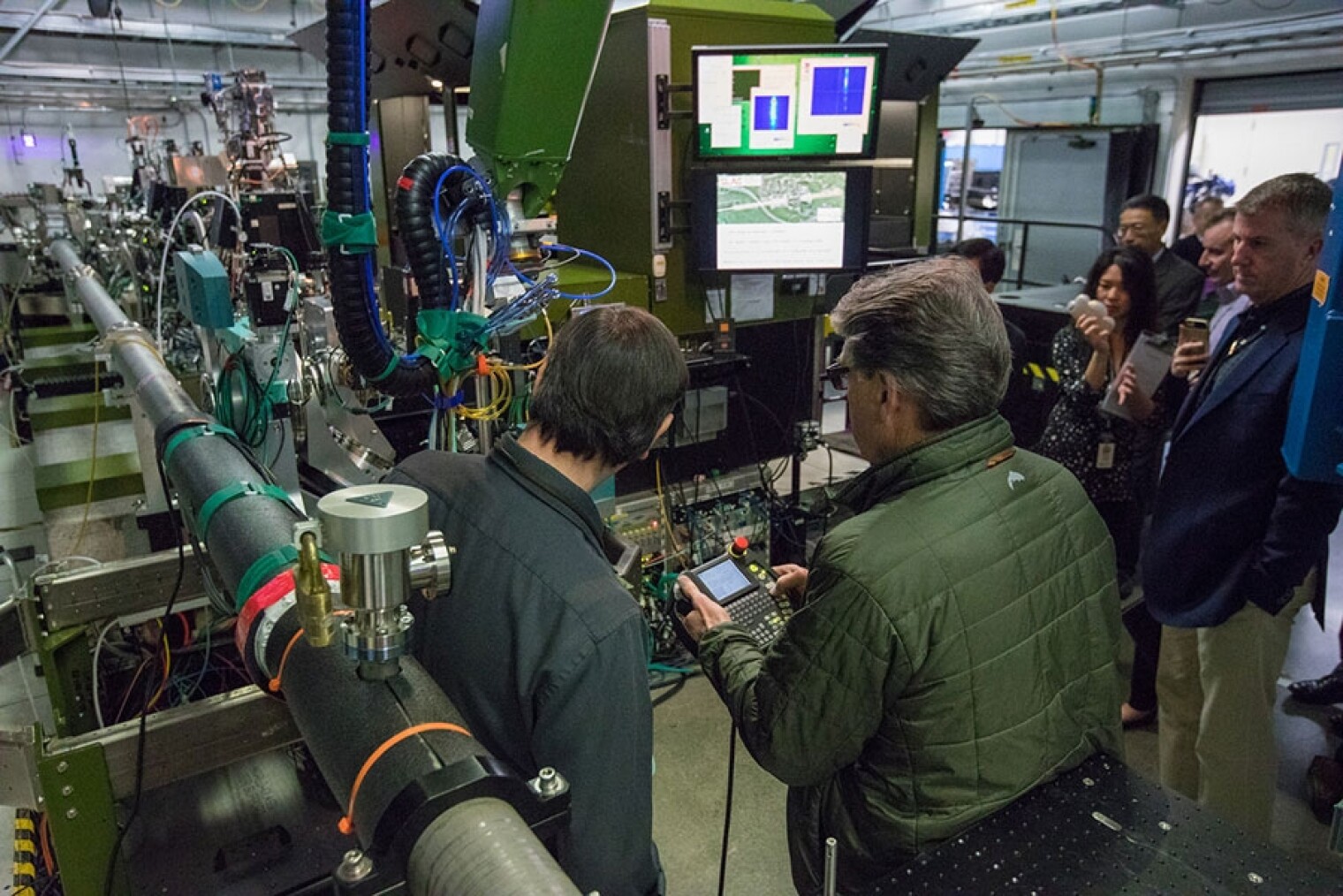| |
What’s Ahead
 |
| In this photo, meteorologist Tom DiLiberto presents the National Oceanic and Atmospheric Administration’s Science on a Sphere data visualization exhibit at the 2016 USA Science and Engineering Festival. At this year’s festival, taking place this weekend, AIP and a number of its member societies will be presenting the “Everyday Physics” exhibit, which will demonstrate how the physical sciences are involved in all aspects of everyday life. (Image credit - NOAA) |
Two Major STEM Education Events Convening in DC
Educators, students, scientists, and industry and government leaders will be convening this week in Washington D.C. for two high profile events focused on STEM education. Wednesday through Friday, U.S. News and World Report will be hosting its annual STEM education and workforce conference, with the theme of “Skills, Jobs and the New Collar Economy.” Among the keynote speakers will be Colorado Governor John Hickenlooper (D), Oklahoma Governor Mary Fallin (R), and White House Office of Science and Technology Policy Assistant Director for STEM Education Jeff Weld. On Thursday, several individuals will be inducted into the U.S. News STEM Leadership Hall of Fame, including National Science Foundation Director France Córdova.. The 2018 USA Science and Engineering Festival is also hosting several events geared towards encouraging students to pursue STEM careers, culminating in a weekend Festival Expo open to the public.
NASA Heliophysics Advisory Panel Meeting
The advisory committee for NASA’s Heliophysics Division is meeting on Thursday and Friday in Washington, D.C. Acting Division Director Peg Luce will kick off the meeting with a general division update and discussion of the implications of flat out-year budgets for the DRIVE initiative, a top priority of the 2013 decadal survey for solar and space physics. The committee will also receive an update on Heliophysics Science Centers, which the decadal recommended that NASA and the National Science Foundation create as part of the initiative. The final fiscal year 2018 spending bill, which provided a 1 percent budget increase for the division, expressed support for establishing such centers. Implementation issues with the centers were discussed at the committee’s previous meeting in December 2017. The committee will also discuss a charge to review how the Research and Analysis program identifies and reviews interdisciplinary and high-impact, high-risk projects. The meeting will be webcast.
NOAA Science Advisory Board Convening Early Next Week
The National Oceanic and Atmospheric Administration Science Advisory Board is meeting next Monday and Tuesday in Washington, D.C. In addition to receiving updates from NOAA Acting Administrator Tim Gallaudet and Acting Chief Scientist Craig McLean, the board will hear presentations on the recently released decadal survey for space-based Earth science and on an upcoming National Academies study to establish a community-wide vision for the future of the U.S. weather enterprise. The meeting will be webcast, and several meeting documents are already posted here.
AMS Hosting Forecasting and Water Management Workshop
On Tuesday and Wednesday, the American Meteorological Society Policy Program is convening a workshop to examine how advances in forecasting can inform water resources management. A key goal is to identify opportunities for more effective collaboration between forecasters and water managers. Workshop participants will discuss how forecasts are used by water managers, how development of subseasonal and seasonal forecasts will affect water resource managers, and what are promising placed-based and federal policy options, among other topics. The workshop will conclude with a congressional briefing on Wednesday afternoon.
|
|
In Case You Missed It Webb Telescope Delay Likely to Lead to Cost Cap Breach
NASA announced on March 27 that the launch of the James Webb Space Telescope (JWST) will be further delayed by at least one year. The announcement follows a report by the mission’s standing review board, which concluded with 70 percent confidence that launch would be possible by May 2020 following setbacks in assembly and testing of the telescope. NASA will now establish an independent review board (IRB), chaired by Thomas Young, former president of Martin Marietta. The IRB will deliver its assessment in May, and NASA plans to report to Congress in June with an updated launch date and a determination of whether JWST will breach its $8 billion development cost cap. If the cap is breached, as seems likely, NASA will require Congress’ permission for work on the mission to continue. Speaking at the National Academies Space Science Week on March 28, NASA Astrophysics Division Director Paul Hertz said additional development funding could be diverted from JWST’s planned post-launch operations budget and that he thinks the impact on the rest of the division’s portfolio would be modest.
NASA Suggests Pushing Back Astrophysics Decadal Survey
At a media briefing on the JWST delay, Thomas Zurbuchen, the head of NASA’s Science Mission Directorate, said it might be desirable to delay the next National Academies decadal survey for astronomy and astrophysics, currently due for release in 2020. He remarked,
Discussion of the matter at Space Science Week established that the National Academies is unwilling to conduct two decadal surveys simultaneously, meaning the next planetary sciences decadal survey would have to be pushed forward. Anne Kinney, the head of NSF’s Mathematical and Physical Sciences Directorate, said she would prefer not to delay the survey. NASA Names Nicola Fox Next Heliophysics Division Director
 |
| (Image credit – NASA / Johns Hopkins APL) |
NASA has selected Johns Hopkins University Applied Physics Laboratory (APL) solar physicist Nicola Fox to be the next director of its Heliophysics Division. Fox is a senior member of the team working on the flagship Parker Solar Probe and will join NASA in August following the mission’s anticipated launch this summer. She has worked at APL since 1998 and before that she was at NASA’s Goddard Space Flight Center. She received her Ph.D. in space plasma physics in 1995 from Imperial College in London. Fox succeeds Steve Clarke, who was detailed to the White House Office of Science and Technology Policy last summer. Peg Luce has been serving as acting director since then.
Pruitt Says EPA Will Only Use Research with Public Data
In an interview with the Daily Caller, Environmental Protection Agency Administrator Scott Pruitt announced that the agency will only rely on research findings with publicly available data in developing new regulations. Pruitt said, “We need to make sure [studies’] research and methodology are published as part of the record. Otherwise, it’s not transparent. It’s not objectively measured, and that’s important.” The policy shift reflects provisions in the House Science Committee’s “Honest and Open EPA Science Treatment (HONEST) Act,” which the House passed one year ago on a mostly party-line vote and is still pending in the Senate. Last year, Pruitt implemented provisions from another pending Science Committee bill when he stipulated that recipients of EPA grants cannot simultaneously serve as members of the agency’s advisory panels. Critics of Pruitt’s latest move argue it unduly restricts the scope of research on which EPA can rely. In a New York Times op-ed, Obama administration EPA officials Gina McCarthy and Janet McCabe charged, “Mr. Pruitt’s goal is simple: No studies, no data, no rules. No climate science, for instance, means no climate policy.” They also warned that the new policy “could be a catalyst for the unraveling of existing public health protections if the studies used to justify them could no longer be used by EPA.”
ITER Avoids Near-Term Delays with Increased US Contribution
Bernard Bigot, head of the multi-national ITER fusion facility under construction in France, said last week that the increased U.S. contribution to the project provided by the final spending bill for fiscal year 2018 will “prevent ITER having to announce project delays in 2018.” Congress allocated $122 million for “in-kind contributions and related support activities,” over double what it provided last year. The amount is equal to the level of U.S. hardware contributions DOE has estimated is necessary for ITER to achieve first plasma by 2028, a key milestone. However, the bill does not address the U.S.’s backlog of cash obligations, which Congress has withheld. Bigot noted that cash contributions will ultimately be required to keep the project on track, and said he “hope[s] that at least maybe a small part of the U.S. 2018 contribution could be in cash so as to give a political signal to the other ITER members.” The Trump administration is currently assessing whether to remain in ITER as part of a broader nuclear energy policy review.
Energy Secretary Perry Tours California Labs
 |
| Energy Secretary Rick Perry toured SLAC National Accelerator Laboratory in Menlo Park, California, on March 28. (Image credit - Dawn Harmer/SLAC, CC BY-NC-SA 2.0= |
Energy Secretary Rick Perry continued his tour of the department’s 17 national labs last week, visiting the four that are in California. At Lawrence Berkeley National Laboratory, Perry visited beamlines optimized for battery research at the Advanced Light Source, toured the Molecular Foundry, and signed the Cori supercomputer at National Energy Research Scientific Computing Center. Perry also delivered addresses to employees at SLAC National Accelerator Laboratory and at Lawrence Livermore and Sandia National Laboratories. A video of the SLAC town hall is available here. After Perry’s talk, Stanford University Provost Persis Drell told The Stanford Daily that she thought he did an “outstanding job” expressing his support for national lab researchers, and added, “What Secretary Perry has done, so far, is deliver a 2018 budget for science that’s the best budget we’ve seen in a long, long time and that’s great.”
|
|
Events This Week
CMU: Energy Week (continues through Friday)
Carnegie Mellon University (Pittsburgh, PA)
Saturday, April 7 USA Science and Engineering Festival (continues Sunday)
10:00 am - 6:00 pm, Sat; 10:00 am - 4:00 pm, Sun
Washington Convention Center (801 Mt. Vernon Place NW, DC)
Monday, April 9 NOAA: Science Advisory Board meeting (continues Tuesday)
9:30 am - 5:00 pm, Mon; 8:30 am - 12:10 pm, Tue
Westin Washington Hotel (1400 M St. NW, DC)
Webcast available
|
|
Opportunities House Appropriations Subcommittees Accepting Input on FY19 Budget
Several House Appropriations subcommittees are accepting testimony from outside witnesses as they develop spending legislation for fiscal year 2019. The Commerce, Justice, Science Subcommittee is accepting submissions through April 27 and the Energy-Water Development Subcommittee is accepting submissions through April 20. Details for other subcommittees are available here.
APS Seeking Policy Intern
The American Physical Society is accepting applications for a science policy internship position in its Office of Government Affairs in Washington, D.C. Responsibilities include working with staff on federal science budget tracking and science infrastructure initiatives as well as assisting with advocacy efforts involving APS members, among other duties. Individuals with a bachelor’s degree are eligible, with preference given to physical sciences and public policy majors.
NSF Updating Geosciences Roadmap
The advisory committee for the National Science Foundation’s Geosciences Directorate is seeking public comment on its efforts to update a 2014 report entitled “Dynamic Earth: GEO Imperatives & Frontiers 2015-2020.” The committee is requesting suggestions on new organizational structure and content, specifically recent developments and exciting areas within the geosciences. Comments should be submitted to geovision@nsf.gov by April 15.
For additional opportunities, please visit www.aip.org/fyi/opportunities. Know of an upcoming science policy opportunity? Email us at fyi@aip.org.Know of an upcoming science policy event? Email us at fyi@aip.org.
|
|
Around the Web
News and views currently in circulation. Links do not imply endorsement.
White House
Congress
Political Engagement
Science, Society, and the Economy
Education and Workforce
Research Management
Labs and Facilities
Energy
Space
Weather, Climate, and Environment
Defense
- Deputy Secretary explains priorities in evolving the future force (DOD)
- Army acquisition chief revamping R&D funding (National Defense Magazine)
- Air Force Secretary Wilson: Space programs can move faster, but Congress has to tolerate some failures (SpaceNews)
- Space Force fans, be careful what you wish for (SpaceNews, perspective by Sandra Erwin)
- Physicists decry cuts to NNSA inertial fusion program (Physics Today)
- Pentagon, Raytheon re-energize directed-energy weapons push (Stars and Stripes)
- Lawrence Livermore to lead United States-United Kingdom consortium for demonstrating remote monitoring of nuclear reactors (LLNL)
- How to spot a nuclear bomb program? Look for antineutrinos (New York Times)
- Nuclear weapons dangers and policy options (Physics Today, paper by Steve Fetter, et al.)
- On Iran and North Korea: Don’t trust, and verify, verify, verify (Boston Globe, perspective by Ernest Moniz)
Biomedical
International Affairs
|
|
|
| |
| |
|


